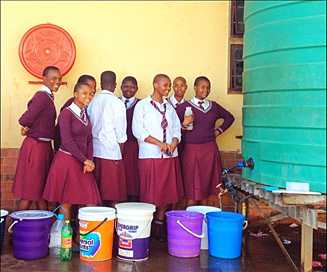Global Disease Detection Program: South Africa

Students collect water at a high school in South Africa. This school and a nearby college were the sites of diarrheal disease outbreaks.
The Centers for Disease Control and Prevention (CDC) started work in South Africa in 1989, assisting non-governmental and community-based organizations working with HIV/AIDS. In 1994 at the onset of democracy in South Africa, CDC began to collaborate with the Ministry of Health’s (MoH) National Department of Health (NDOH) and the National Health Laboratory Service (NHLS) to conduct public health epidemiology training; develop national health goals and objectives; develop national HIV clinical, ethical, and research guidelines; and support HIV/AIDS and tuberculosis (TB) programs. CDC also plays an essential role in implementing the U.S. President’s Emergency Plan for AIDS Relief (PEPFAR).
The South African Global Disease Detection (GDD) Center was established in 2010 in coordination with country partners. The Center provides leadership, training, and technical assistance to strengthen regional ability to confront new emerging infectious disease challenges, such as influenza, zoonotic diseases, and other host-country public health priorities.
Responding to Health Threats
The Center conducts surveillance and research for human and animal influenza and pneumonia. The Center’s influenza program has contributed to national policy and clinical guidelines in five countries, and has also built laboratory capacity through training. The Center is partnering with government and private manufacturers to advocate for increased influenza vaccination use in South Africa and throughout the region.
Building Disease Detection and Response Capacity
Using the International Health Regulations (2005) as an organizing framework, the Center links the strengths of overseas CDC programs with country and regional partners – relying on local rather than remote resources.
The Center’s integrated approach helps reduce detection and response time by developing sustainable regional capacity in:
- Emerging infectious disease detection and response
- Field epidemiology and laboratory training
- Pandemic influenza preparedness and response
- Laboratory systems and biosafety
- Zoonotic disease research and control
- Health communications and information technology
Connecting Resources
The Center engages its partner network to harmonize strategies and leverage resources to improve detection and response to emerging infectious diseases. This includes technical support for development of a National Public Health Institute, coordinating capacity building for detection and response to food-borne disease outbreaks in collaboration with World Health Organization, the National Institute for Communicable Disease, and U.S. CDC, and linking FELTP trainees with the Ministry of Health to support outbreak responses.
Additional Resources
Global Disease Detection Stories: Tracking and Taming Zoonotic Diseases in South Africa
CDC Global Disease Detection (GDD) South Africa
Zoonotic Diseases
One Health
University of Pretoria Zoonoses Research Unit
National Institute for Communicable Diseases
Onderstepoort Veterinary Institute
Making a Regional Impact
From 2013-2015, the GDD Center in South Africa has supported:
- Effective response to over 40 outbreaks in 7 countries, including dengue fever, cholera, Crimean-Congo hemorrhagic fever, and Legionella pneumonia
- Ongoing disease surveillance for select diseases and syndromes
- Establishment of two new laboratory diagnostic tests
- Graduation of 16 future global health leaders from eight countries as part of the two-year Field Epidemiology Training Program
- Training of over 1,000 public health officials from eight countries in short-term public health exercises, including epidemiology and laboratory and rapid response
- Page last reviewed: April 4, 2016
- Page last updated: April 4, 2016
- Content source:


 ShareCompartir
ShareCompartir